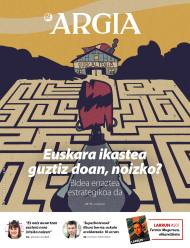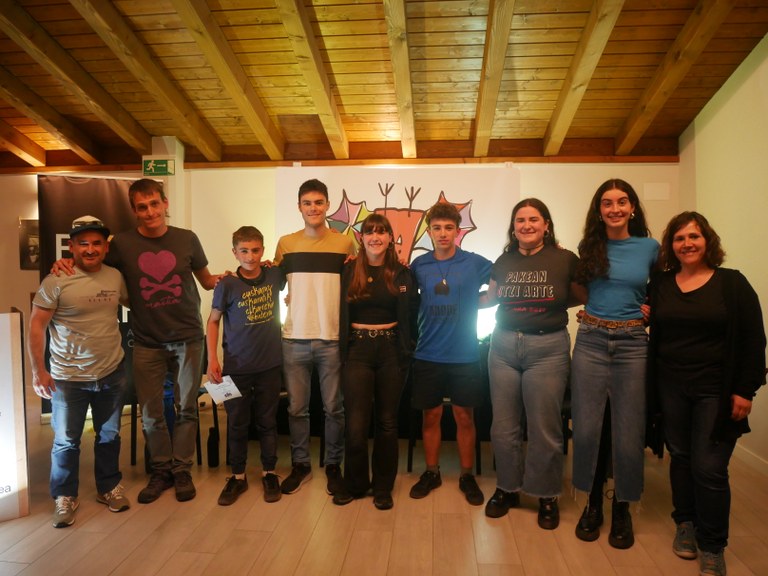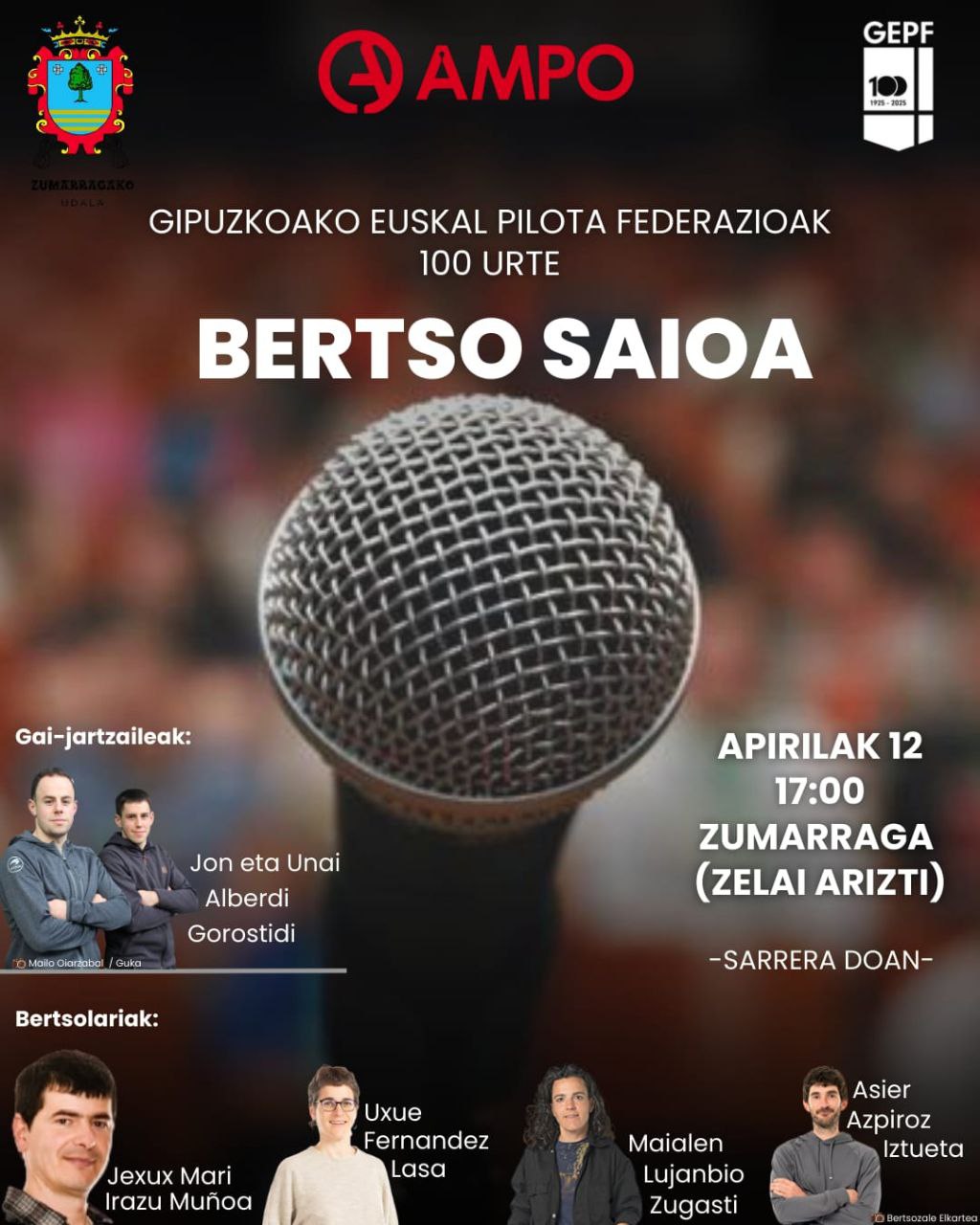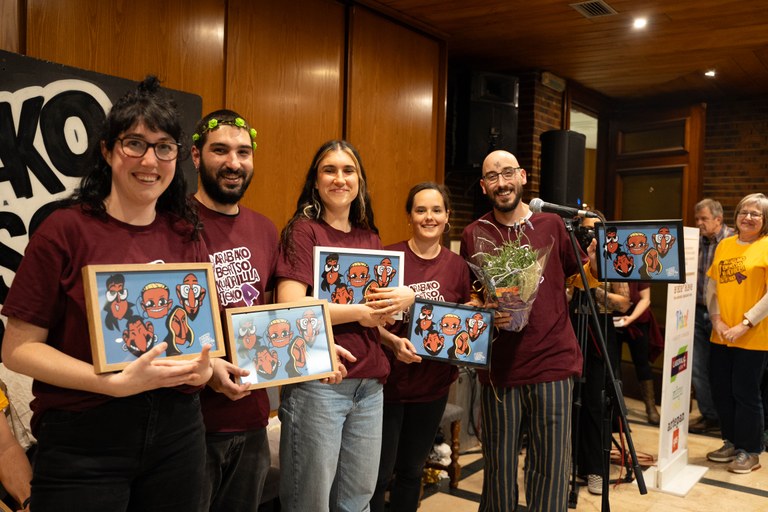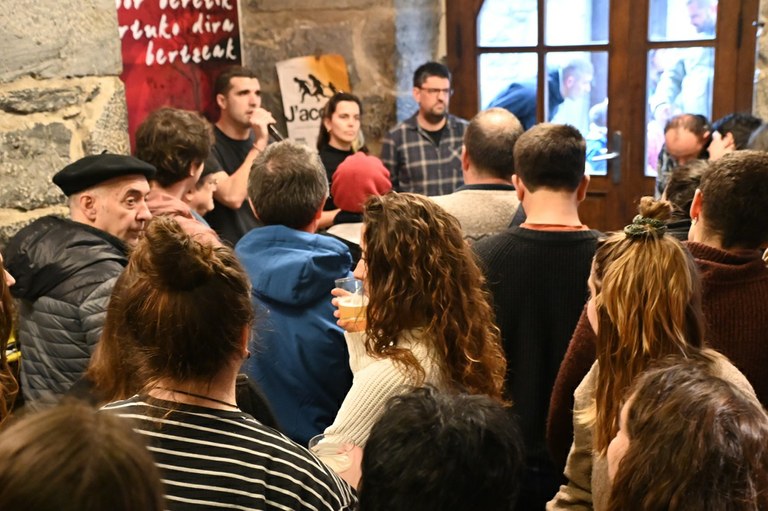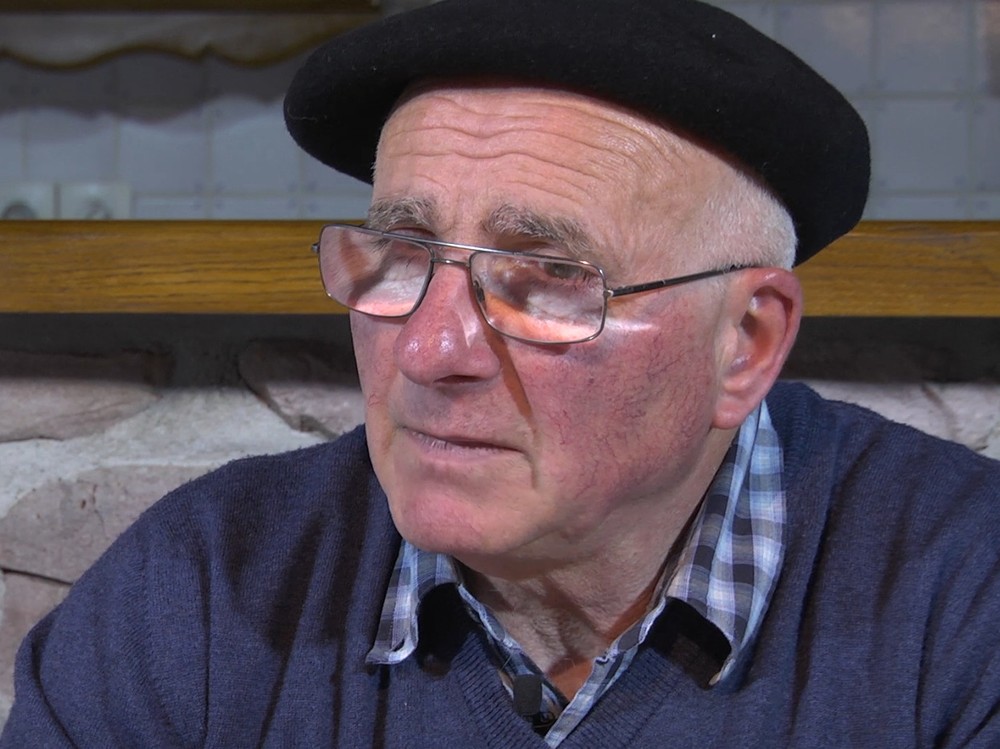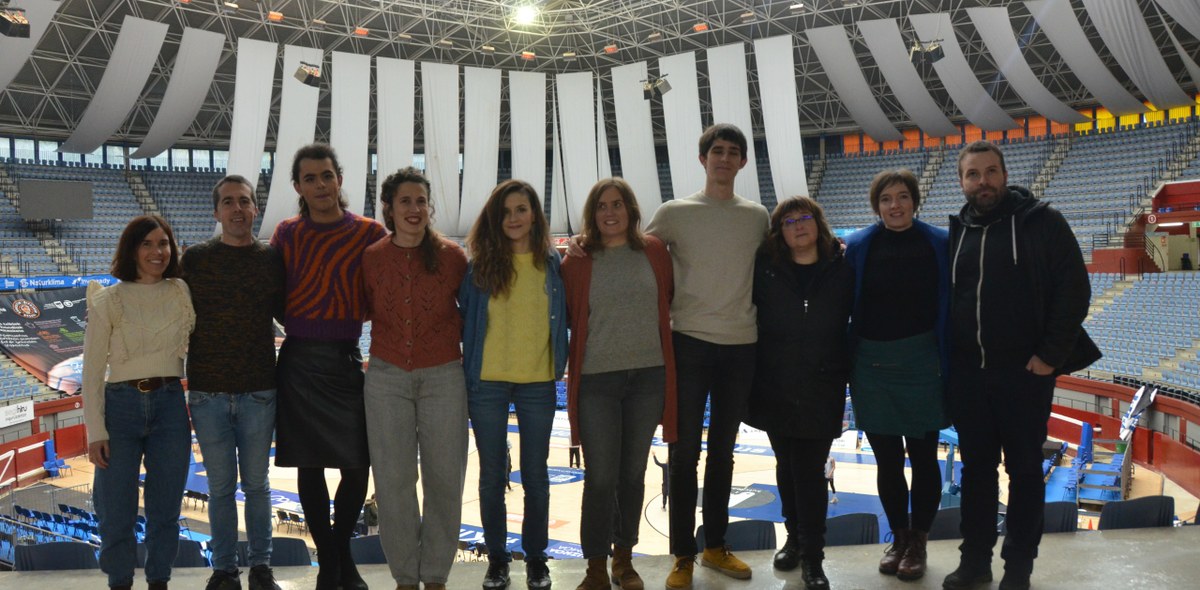"It would be my dream to sing with Xenpelar."
- Maddi, 19, holds a degree in mathematics at the Faculty of Science and Technology at UPV/EHU in Leioa, has musical studies and is also a very expert bertsolari. And it has warms to be better than a good bertsolari, as we've seen in the different squares. “Are the new ones going to be born?” We already have them there a long time ago!

The appointment has not been specified immediately. You are studying the second year of Mathematics at the UPV/EHU, in Leioa, and quite well, giving you all...
Yes, I'm making a demanding career and I have to work a lot. Studying in college takes a lot of time. In my case, I think it takes more time to study at home than to go to school. The school hours are four a day, no more, but you have to come home and study, parties and weeks, and weekends. Sometimes, throughout the week, we gather in Leioa several people and learn in the university library, asking each other and with many doubts.
What got you to study Mathematics?Before I got into college,
I didn't know where I was going. The usual doubt: going down the road of music [Has a flute race travesera] or through science. I finally decided to take the path of science, thinking that if in the future I want to explore some other field, it will be easier to get back to literature, music or something like that, and not science or technology, because once science has been abandoned, it is difficult to relink it. That's what I thought.
They say it's a very demanding language...
Yes, a lot. To me, from a young age, I thought it was an amazing thing. I saw the jobs and demonstrations that mathematicians did, and I thought they were very special. “I have to learn this.” Like that. Some people will think it's also a matter of ease, and it's true that in high school I understood very well in mathematics -- I'm not going to lie to you, ha! -- but on the first day that I started running, I realized it wasn't like that.
What do you mean?
In Baccalaureate, you get good math scores, and you think you're the best in the world, you've learned everything, and you go into college and you're told, frankly, “Even if you’ve learned what you’ve learned, you don’t know anything about mathematics, now we start, from scratch, to learn this!” This first blow frightens you, but you soon realize that the world of mathematics is very nice, much nicer than we learned at the time of high school.
You said the blow...
Yes. I remember, in a class, I didn't understand anything! Nothing like that had ever happened to me! It was early in the course, I didn't know what the professor was doing. Then, after the weeks, and doing the work conscientiously, I began to understand it! But in the meantime, to know how many audios we send, classmates, and, in my case, to the friends who studied Philosophy. We complained that nobody understood anything. We were all in the same situation, and that also created complicity between us. This helps a lot, and parents help as well: “Stop, Maddi, rest. You will follow!” they told me. Thank you.
Do we have to talk about numbers?
With me, no! I haven't seen numbers since I started the race. I've seen many letters from the Greek alphabet! People think that our career is going to be making a continuous calculation, making increasingly complicated and complicated calculations. But that's not the case. In mathematics, we learn from where the theorems we've learned in life come from, how our reasoning has come to some conclusions ... Mathematics has more to do with logic, with reasoning, with philosophical thinking than with the ability to calculate them.
You do no more than numbers, you are very good at calculating all the measurements of the verses, as we have seen you sing.
Ha ha ha! Calculating the measure helps melody, not counting syllables, for example. Plus, it's sung by dots! When I was growing up, when I was about four years old, I remember that we were in the kitchen at home, in Azkoitia, and that was the final of the Bertsolaris Championship on television. I wasn't interested, of course, but at least I played, I took the melody and I sang the words that I had invented myself. Once, playing with his father, and putting the rhymes, he said: “This is going to give us bertsolari!” I had to be four years old, but I came up with an idea. “You said it in jokes, but you will see it already,” I told myself.
I had seen it! We've seen you sing in several squares, very elegant. How did you start on this road from the children's anecdote?
In the 5th grade of Primary, within the regulated teaching, they began to teach us Bertsolarism classes at the Ikastola Armentia. At the same time, I joined the Bertsolarism workshop, in the space of the table. There I started. Upon completion of the regulated education, I enrolled in the bertso-eskola of the ikastola. We had Oier Arbina as a professor. And go ahead. They explained to us what the little zortziko and the big zortziko, the laughing families are... I remember we did a lot of rhyme games and then we started writing verses. After about two years we started singing...
How was that big step?
One day, my friends Euken and I asked Oier [Arbina]: We want to start improvising! And we started making the first coplas, with a lot of help and a lot of time!
What about childhood has been completed: I'll be bertsolari!
I'm not yet saying it's bertsolari. Ha ha ha! The word “bertsolari” gives me great respect. Like Plazandrea. You can walk singing in eleven places, but many people find it hard to say “bertsolari”. It costs me a lot... I once came up with the following: After I started in the school championship, after the Euskal Herria finals, I got a lot of shows. And as I always saw myself in the plaza, I began to feel “more bertsolari.” Then, after winning the first school txapela in Álava, I started thinking: “Maybe... the same.. I'm doing something!" Ha ha ha! But for example, I never showed up saying, "Oh, I don't." “Hi, I’m Maddi Agirre, bertsolari.” Never!
Mathematician, yes. Bertsolari, no? In the case of the
mathematician, I'm going to get the title that the university has given me, and that will prove that I'm a mathematician. In Bertsolarism there is nothing to do and it is harder to measure at what point you are in these kinds of activities. If people say I'm bertsolari, I won't say no, but I'm not going to say that anywhere.
“Maddi, please come to the microphone... A theme for you, to sing three berts in the melody and measure you want...”. And he put the theme, and not infrequently, the theme, the one that put the theme on him, the one that put it on him.
There is always fear, of where the one who puts the theme comes from, of what issues he puts you on. On the other hand, I believe that bertsolari also has the responsibility, among other things, of being aware of the present situation, and also the possibility of making its ideas known, because for that it has the microphone. Along with this, there are several themes, the deflictives, that are afraid of singing. But we also have to take away that concern: the things that make sense, and well-argued, go on!, we shouldn't be afraid.
You've done a ten-year musical career, that also helps you sing...
Yes, of course. I've been singing in a choir for several years, and I appreciate that work a lot because in addition to singing, it helps me a lot to learn songs easily. I think in the song I feel pretty good, with tuning and timbre, and that's what a lot of listeners have said to me. I attach importance to this aspect, and when I myself am listening to the Bertsolaris, I also looked at it.
The singer Xabier Amuriza...
It's the oldest bertsolari I've ever met. It was last year in the cave of Mairuelegorreta. We were Look [Amuriza] and I was singing, and there was Xabier, listening. When I saw that I was among the people, it gave me great respect, I thought I would have to sing well. Ha ha ha! But we did our job well, and then Xabier ended the session and came to congratulate me. He told me he was singing well and I was happy.
What do you say about the bertso-lagunak?
When they call you, that's the question, who you have to sing with. And for example, it makes you an incredible illusion when you read. Andoni Egaña .. Sebastián Lizaso...” Especially in the early days. First, it's a tremendous illusion, a passion to sing with them. Then, as the singing day moves, the respect is imposed again: "Oh, mom! To know what you'll think... I can’t sing a good verse!” But they're very nice people, they don't judge you, they keep in mind that you're young and they help you a lot. For example, in summer I sang in Zaballa with Sebastian Lizaso, and very well. It was very special.
You mean in Zaballa, in jail?
Yes. Sebastian and I, and two prisoners, also sang. In fact, they've organized a bertso-eskola in Zaballa, and they meet once or twice a week. They have Oihane Perea as teachers and they have an impressive pace. They are very good at bertsos, really, and among them they also organize performances, with some famous bertsolari, and so went Sebastián and I, in one of them. It was a great program. We, for their part, were able to know the life of the prison, the experiences of the prisoners, their way of life... and how much they thank the people from outside to go and sing there! We were greeted with all kinds of generosity and I discovered a totally unknown world. That memory is forever.
We saw you in the evenings of Vitoria, with Maialen Lujanbio, Gorka Pagonabarraga and Iñaki Viñaspre next to you. Irati Martínez was in charge of making the issues available to you. You did a good exercise and you did it too.
But that is not always the case! Ha ha ha! I was worried that the machete square session always caught you in parties, and many times you have your head somewhere else. “While I’m at party, I’ve been put on a show in Vitoria, with whom and with Maialen Lujanbio! A day that is 7 August!” This year I had experience from previous years and I was mentalized: I had to try to do a good session, taking into account the bertsolaris friends, taking care of the voice, the head at its point... I was confident. “You’re going to sing with Maialen Lujanbio, Maddi! Take it up! Do a good try so that you don’t regret it later!” That's how I went and everything went well! Ha ha ha! But I have already said that this is not always the case.
Any bertsolari? Your affection, let's say. I drink from many bertsolaris, but lately I liked the
bertso of Subai [Hill]: how unites the bertso, each point with the next... Her irony, her characteristic humor, sometimes dark ... I don't know how to explain it well, but I really like its verse.
Little you said: I'll be bertsolari! Have you ever said, “I will be champion of bertsolaris!”
Think a lot. I thought I'd like to be a champion. Tell me, no. And the txapela, at what level? One of them is the Bertsolaris Championship of the Basque Country, and the other is the Bertsolaris Championship of the Basque Country. At school, yes, I said: “I’ll get the txapela!” Ha ha ha! I saw it by hand, or it was my audacity. But today I dare not say where I'm going, what's going to happen in the next few years. He wants to be a champion, but...
You are nineteen years old... Two years ago, the Championship was held in 2022... You're a mathematician, an inexperienced calculator, and you can't do the calculation of years. In the 2026 championship no, in 2030 you still get complicated... See what the 2034 Absolute Championship means for Maddi Agirre Epelde.
Ha ha ha!
* * * * * * *
Tradition
“Lately I’m pulling the old bertsolaris, because I’ve discovered that tradition, or traditional Bertsolaris, is not something that has gone away, but a source that we are constantly drinking. I gather the books of the old bertsolaris, I listen to the verses, I do with the old melody... It seems to me the foundation of our work.”
Euskalkia (i) “We live
in Vitoria but on weekends we spent them in Azkoitia [our mother’s town]. But my parents have raised us at once. We regret not having received the language of Azkoitia from the cradle, although we have received it in part, because on weekends we spent them in Azkoitia. But I think it has not been enough to assimilate the dialect well.”
Euskalkia (ii) "I think
I would be able to have a correspondence with the Azkoitiarras, not as elegant as those here, but in the most beautiful way of Azkoitia. But I've come and I think: ‘I am not from here. If I start like here, you’ll soon start telling me things and two!’ And rarely dare I start with azkoitiarras. My sister and I talked a lot about it. We told our mother: Why hasn't he raised us from Azkoitia? !”.
LAST WORD
Xenpelar’s fan “It
would be my dream to sing with Xenpelar. I have read his book and I really like his bertso. I’ve become your fan.”
Maiatzaren 8an hasiko da Bizkaiko Bertsolari Txapelketako sailkapen fasea. Zortzi saio bikoitz jokatuko dira maiatzeko eguenetan. Sarrerak eskuragai daude bertsosarrerak.eus atarian.
Asteburu honetan hasiko da Gaztetxeak Bertsotan egitasmo berria, Itsasun, eta zazpi kanporaketa izango ditu Euskal Herriko ondorengo hauetan: Hernanin, Mutrikun, Altsasun, Bilboko 7katun eta Gasteizen. Iragartzeko dago oraindik finala. Sariketa berezia izango da: 24 gaztez... [+]
Vagina Shadow(iko)
Group: The Mud Flowers.
The actors: Araitz Katarain, Janire Arrizabalaga and Izaro Bilbao.
Directed by: by Iraitz Lizarraga.
When: February 2nd.
In which: In the Usurbil Fire Room.







